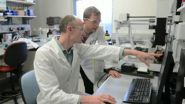(Press-News.org) NEW YORK—Jill Abramson was recently ousted from her position as the executive editor of The New York Times for being, among other things, too "pushy." But did Abramson—who has also been described by the media as "polarizing" and "brusque"—know during the course of her tenure that others viewed her as being overly assertive? A new study from the Columbia Business School suggests that there's a great chance she didn't.
"Finding the middle ground between being pushy and being a pushover is a basic challenge in social life and the workplace. We've now found that the challenge is compounded by the fact that people often don't know how others see their assertiveness," said Daniel Ames, professor of management at Columbia Business School and co–author of the new study. "In the language of Goldilocks, many people are serving up porridge that others see as too hot or too cold, but they mistakenly think the temperature comes across as just right—that their assertiveness is seen as appropriate. To our surprise, we also found that many people whose porridge was actually seen as just right mistakenly thought their porridge came off as too hot. That is, they were asserting themselves appropriately in the eyes of others, but they incorrectly thought they were pushing too hard."
Based in part on research previously conducted by Ames and former Columbia Business School Professor Frank Flynn, the new study is called, "Pushing in the Dark: Causes and Consequences of Limited Self-Awareness for Interpersonal Assertiveness" and will be published in Personality and Social Psychology Bulletin this month. In short, the research shows that many people seen by others as under–assertive or over–assertive think they're appropriately assertive. The study also reveals that people seen as getting assertiveness right often mistakenly think they've gotten it wrong.
The Research
Ames and fellow researcher Abbie Wazlawek—a doctoral student at Columbia Business School—conducted four studies to test their hypotheses about the connection between assertiveness and self–awareness. Three of the four studies involved participants who were MBA students enrolled in negotiation courses at Columbia Business School, and one study involved an online survey of 500 US adults.
The MBA student studies paired up developing professionals for mock negotiations over issues such as licensing rights. After the deal–making, each person answered questions about their own assertiveness and their counterpart's assertiveness. The negotiators were then asked to guess what their counterpart said about them. A key question for the researchers was whether people knew what their counterparts thought of them.
The Results
The studies found that, generally speaking, negotiators have a lot of work to do in the self–awareness department. For example, one study found that:
57 percent of people actually seen by their counterpart as under–assertive thought they had come across as appropriately assertive or even over–assertive.
56 percent of people actually seen by their counterpart as over–assertive thought they had come across as appropriately assertive or even under–assertive.
Together, these results suggest that people seen as getting assertiveness wrong in the eyes of others had about a coin–flip's chance of recognizing how they were seen.
"Most people can think of someone who is a jerk or a pushover and largely clueless about how they're seen," said Ames. "Sadly, our results suggest that, often enough, that clueless jerk or pushover is us."
The researchers were surprised to discover another pattern in their results. Ames and Wazlawek found that many people getting assertiveness right mistakenly thought they were seen as pushing too hard. In multiple studies, Ames and Wazlawek observed a good share of people displaying what they called the "line crossing illusion." These people believed that they came across as being too assertive—or had crossed a line—during negotiations, when in fact their counterparts saw them as being appropriately assertive.
While the "line crossing illusion" might seem like a harmless or even endearing mistake, Ames and Wazlawek showed that it can be costly. Those who mistakenly thought they had over–asserted themselves were more likely to try to repair relationships with their partners, sometimes agreeing to a less valuable subsequent deal just to smooth things over. As the researchers put it, these negotiators were attempting costly repairs for something that wasn't broken. The result was that both sides frequently lost out on what could have been a better deal.
For more information on cutting–edge research being conducted at Columbia Business School, please visit our online thought leadership magazine, Ideas at Work.
INFORMATION:
About Columbia Business School
Columbia Business School is the only world–class, Ivy League business school that delivers a learning experience where academic excellence meets with real–time exposure to the pulse of global business. Led by Dean Glenn Hubbard, the School's transformative curriculum bridges academic theory with unparalleled exposure to real–world business practice, equipping students with an entrepreneurial mindset that allows them to recognize, capture, and create opportunity in any business environment. The thought leadership of the School's faculty and staff, combined with the accomplishments of its distinguished alumni and position in the center of global business, means that the School's efforts have an immediate, measurable impact on the forces shaping business every day. To learn more about Columbia Business School's position at the very center of business, please visit http://www.gsb.columbia.edu.
Study reveals that many people are oblivious to how they come across to counterparts and colleagues
Columbia Business School research highlights the disconnect between peoples' own views and their counterparts' views of their assertiveness—and the impact it can have on negotiations
2014-07-01
ELSE PRESS RELEASES FROM THIS DATE:
All the world's oceans have plastic debris on their surface
2014-07-01
However, central surface waters of the oceans may not be the final destination of plastic debris since, as indicated by the study performed by the Malaspina Expedition, large amounts of microplastics could be passing to the marine food chain and the ocean floor. Results of the study, led by the University of Cadiz (Spain), have been published in the journal Proceedings of the National Academy of Sciences (PNAS).
Andrés Cózar, researcher from the University of Cadiz, explains: "Ocean currents carry plastic objects which split into smaller and smaller fragments due to solar ...
Genetic evidence that body mass increases the risk of asthma in mid-childhood
2014-07-01
Some of the increase in asthma risk toward the end of the 20th century could be attributed to the increase in body mass index (BMI) in mid-childhood, according to new research published in this week's PLOS Medicine. The study, led by Raquel Granell from the University of Bristol, UK, and colleagues, provides genetic evidence that higher fat mass and lean mass increase the risk of asthma in mid-childhood.
The incidence of asthma, a chronic condition caused by inflammation of the airways, has been rising steadily over the past few decades, and it is estimated that 200� ...
Cesarean section linked to slight increase in future stillbirth and ectopic pregnancy
2014-07-01
Caesarean section is associated with a slightly increased rate of subsequent stillbirth and ectopic pregnancy, according to a large study of women living in Demark, published in this week in PLOS Medicine. Given the global increase in Caesarean rates, the results of the study, which was conducted by Louise Kenny and colleagues from University College Cork, Ireland and Aarhus University, Denmark, are of interest to pregnant women, their partners, and healthcare providers.
The researchers obtained data for 832,996 women from Danish national registers regarding their first ...
Catheter ablation a first-line treatment for atrial flutter
2014-07-01
Use of catheter ablation is not only beneficial for treating atrial flutter but also can significantly reduce hospital visits – both inpatient and emergency – and lower the risk for atrial fibrillation, according to research by UC San Francisco.
The study is in the July issue of PLOS ONE and available online.
"We've seen firsthand in our clinical experience that atrial flutter is difficult to control with drugs, even more than atrial fibrillation," said senior author Gregory Marcus, MD, director of clinical research in the UCSF Division of Cardiology. "Based on our ...
New insights from the modENCODE Project are published in Genome Research
2014-07-01
July 1, 2014 – Genome Research publishes six articles online and in print today describing recent advancements from the modENCODE Project. Initially launched in 2007, the goal of the modENCODE Project is to comprehensively characterize functional genomic elements in two model organisms, the fly Drosophila melanogaster, and the worm Caenorhabditis elegans. Comparative analyses in these well-established systems are expected to guide efforts to further our understanding of human biology. The articles published in this issue present new genomic advances shedding light upon ...
New compound blocks 'gatekeeper' enzyme to kill malaria
2014-07-01
VIDEO:
Melbourne researchers are homing in on a new target for malaria treatment, after developing a compound that blocks the action of a key 'gatekeeper' enzyme essential for malaria parasite survival.
The...
Click here for more information.
Melbourne researchers are homing in on a new target for malaria treatment, after developing a compound that blocks the action of a key 'gatekeeper' enzyme essential for malaria parasite survival.
The compound, called WEHI-916, is ...
Analysis of the Chinese facial profile: Contours of the side face in the Tu and Zang ethnic minorities
2014-07-01
Li Haijun and fellow researchers at Minzu University of China, in Beijing, conducted a series of geometric morphometric analyses of the contours of the side face and variations in the Tu and Zang (Tibetan) ethnic minorities from Qinghai Province, in northwestern China.
Their study, entitled "Morphometric analysis of the Chinese facial profile: Contours of the side face and variations in the Tu and Zang ethnic minorities", was published (in Chinese) in the Chinese Science Bulletin, 2014, Vol 59(16).
The team of researchers used advanced digital cameras and image processing ...
Behind a marine creature's bright green fluorescent glow
2014-07-01
Pushing closer to understanding the mechanisms behind the mysterious glow of light produced naturally by certain animals, scientists at Scripps Institution of Oceanography at UC San Diego have deciphered the structural components related to fluorescence brightness in a primitive sea creature.
In a study published in Scientific Reports, an open-access journal of the Nature Publishing Group, Dimitri Deheyn and his colleagues at Scripps Oceanography, the Air Force Research Laboratory, and the Salk Institute for Biological Studies have conducted the most detailed examination ...
Solar panels light the way from carbon dioxide to fuel
2014-07-01
Research to curb global warming caused by rising levels of atmospheric greenhouse gases, such as carbon dioxide, usually involves three areas: Developing alternative energy sources, capturing and storing greenhouse gases, and repurposing excess greenhouse gases. Drawing on two of these approaches, researchers in the laboratory of Andrew Bocarsly, a Princeton professor of chemistry, collaborated with start-up company Liquid Light Inc. of Monmouth Junction, N.J. to devise an efficient method for harnessing sunlight to convert carbon dioxide into a potential alternative fuel ...
Poor physical, financial health driven by same factors
2014-07-01
Poor physical health and financial health are driven by the same underlying psychological factors, finds a new study out of the Olin Business School at Washington University in St. Louis.
Researchers Lamar Pierce, PhD, associate professor of strategy at Olin and PhD-candidate Timothy Gubler found that the decision to contribute to a 401(k) retirement plan predicted whether or not an individual will act to correct poor physical health indicators revealed during an employer-sponsored health examination.
"We find that existing retirement contribution patterns and future ...
LAST 30 PRESS RELEASES:
How much sleep do teens get? Six-seven hours.
Patients regain weight rapidly after stopping weight loss drugs – but still keep off a quarter of weight lost
GLP-1 diabetes drugs linked to reduced risk of addiction and substance-related death
Councils face industry legal threats for campaigns warning against wood burning stoves
GLP-1 medications get at the heart of addiction: study
Global trauma study highlights shared learning as interest in whole blood resurges
Almost a third of Gen Z men agree a wife should obey her husband
Trapping light on thermal photodetectors shatters speed records
New review highlights the future of tubular solid oxide fuel cells for clean energy systems
Pig farm ammonia pollution may indirectly accelerate climate warming, new study finds
Modified biochar helps compost retain nitrogen and build richer soil organic matter
First gene regulation clinical trials for epilepsy show promising results
Life-changing drug identified for children with rare epilepsy
Husker researchers collaborate to explore fear of spiders
Mayo Clinic researchers discover hidden brain map that may improve epilepsy care
NYCST announces Round 2 Awards for space technology projects
How the Dobbs decision and abortion restrictions changed where medical students apply to residency programs
Microwave frying can help lower oil content for healthier French fries
In MS, wearable sensors may help identify people at risk of worsening disability
Study: Football associated with nearly one in five brain injuries in youth sports
Machine-learning immune-system analysis study may hold clues to personalized medicine
A promising potential therapeutic strategy for Rett syndrome
How time changes impact public sentiment in the U.S.
Analysis of charred food in pot reveals that prehistoric Europeans had surprisingly complex cuisines
As a whole, LGB+ workers in the NHS do not experience pay gaps compared to their heterosexual colleagues
How cocaine rewires the brain to drive relapse
Mosquito monitoring through sound - implications for AI species recognition
UCLA researchers engineer CAR-T cells to target hard-to-treat solid tumors
New study reveals asynchronous land–ocean responses to ancient ocean anoxia
Ctenophore research points to earlier origins of brain-like structures
[Press-News.org] Study reveals that many people are oblivious to how they come across to counterparts and colleaguesColumbia Business School research highlights the disconnect between peoples' own views and their counterparts' views of their assertiveness—and the impact it can have on negotiations


